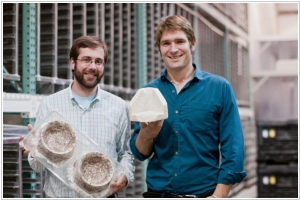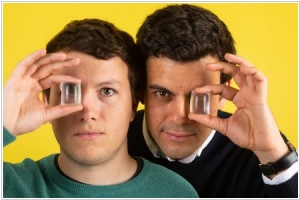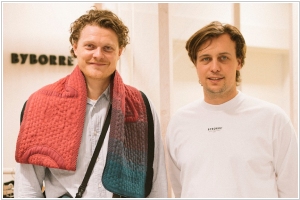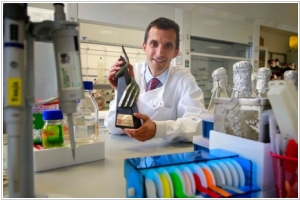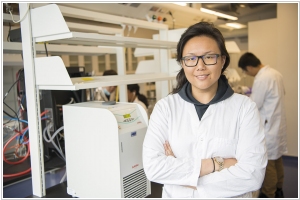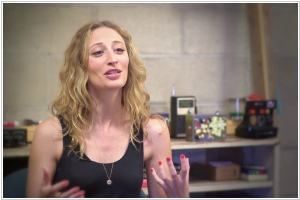1
Country: South Korea | Funding: ₩25.4B
Mycel Project develops and manufactures a wide range of mushroom-based biomaterials that can be used to substitute leather and flesh.
Mycel Project develops and manufactures a wide range of mushroom-based biomaterials that can be used to substitute leather and flesh.
2
Country: USA | Funding: $1.4B
Eastman is a global specialty chemicals company that produces a range of advanced materials and chemicals.
Eastman is a global specialty chemicals company that produces a range of advanced materials and chemicals.
3
Country: USA | Funding: $855.8M
Solugen makes chemicals from custom enzymes and renewable feedstock. It uses dextrose, a simple sugar, and in the future it aims to convert carbon into useful products like building materials and formaldehyde-free resins.
Solugen makes chemicals from custom enzymes and renewable feedstock. It uses dextrose, a simple sugar, and in the future it aims to convert carbon into useful products like building materials and formaldehyde-free resins.
4
Country: Netherlands | Funding: $403.3M
Avantium's YXY plants-to-plastics technology catalytically converts plant-based fructose syrup from corn and wheat sugars into PEF (polyethylene furanoate).
Avantium's YXY plants-to-plastics technology catalytically converts plant-based fructose syrup from corn and wheat sugars into PEF (polyethylene furanoate).
5
Country: USA | Funding: $340.3M
Genomatica manufactures sustainable chemicals from renewable feedstocks.
Genomatica manufactures sustainable chemicals from renewable feedstocks.
6
Country: Israel | Funding: $245.6M
The UBQ proprietary process transforms Residual Municipal Solid Waste (organic and hard-to-recycle materials), destined to landfills, into innovative bio-based UBQ Material, that can be used to make everyday long-lasting products. UBQ's material can be used in current manufacturing processes and is already adopted across sectors (building and construction, consumer durables, logistics and supply chain, retailer environments, and automotive) to substitute oil-based resins. It is compatible with most polymers: polypropylene (PP), polystyrene (PS), acrylonitrile butadiene styrene (ABS), polyolefins and elastomers, making it a great material for injection molding. There is also an alternative for low-flow extrusion.
The UBQ proprietary process transforms Residual Municipal Solid Waste (organic and hard-to-recycle materials), destined to landfills, into innovative bio-based UBQ Material, that can be used to make everyday long-lasting products. UBQ's material can be used in current manufacturing processes and is already adopted across sectors (building and construction, consumer durables, logistics and supply chain, retailer environments, and automotive) to substitute oil-based resins. It is compatible with most polymers: polypropylene (PP), polystyrene (PS), acrylonitrile butadiene styrene (ABS), polyolefins and elastomers, making it a great material for injection molding. There is also an alternative for low-flow extrusion.
7
Country: USA | Funding: $244M
Brimstone Energy is producing mass-market, zero-carbon Portland cement, a key building material.
Brimstone Energy is producing mass-market, zero-carbon Portland cement, a key building material.
8
Country: USA | Funding: $231.6M
Newlight Technologies uses decarbonization technology dedicated to converting greenhouse gas into biomaterials.
Newlight Technologies uses decarbonization technology dedicated to converting greenhouse gas into biomaterials.
9
Country: USA | Funding: $215M
Origin Materials created bio-based plastic bottles containing 80% renewable materials like cardboard and sawdust. Half of its capital investment to date has come from major food corporates like Nestle and Danone.
Origin Materials created bio-based plastic bottles containing 80% renewable materials like cardboard and sawdust. Half of its capital investment to date has come from major food corporates like Nestle and Danone.
10
Country: Japan | Funding: ¥22.6B
TBM has developed CR-LIMEX, a new material made from captured carbon dioxide emitted by power plants mixed with calcium-containing waste and recycled plastic. The material is sturdy enough to be used in construction. The company also sells recycled materials made from consumer waste such as plastic containers and packaging.
TBM has developed CR-LIMEX, a new material made from captured carbon dioxide emitted by power plants mixed with calcium-containing waste and recycled plastic. The material is sturdy enough to be used in construction. The company also sells recycled materials made from consumer waste such as plastic containers and packaging.
11
Country: USA | Funding: $196M
Agilyx created a solutions platform that can take a wide variety of waste plastics and polymers, and chemically recycle those plastics into high value synthetic oils, chemicals and in some cases back to basic monomers that can be used to re-manufacture products.
Agilyx created a solutions platform that can take a wide variety of waste plastics and polymers, and chemically recycle those plastics into high value synthetic oils, chemicals and in some cases back to basic monomers that can be used to re-manufacture products.
12
Country: USA | Funding: $171M
Renmatix focuses on the production of cellulosic sugars from plant-based feedstocks for the improvement of bio-primarily based materials.
Renmatix focuses on the production of cellulosic sugars from plant-based feedstocks for the improvement of bio-primarily based materials.
13
Country: USA | Funding: $132.1M
Ecovative Design is a biomaterials company that makes biodegradable packaging from mushrooms
Ecovative Design is a biomaterials company that makes biodegradable packaging from mushrooms
14
Country: Israel | Funding: $130M
TIPA manufactures bio-based, fully compostable packaging for the food and fashion industry. It compares its packaging material to orange peel, decomposing in 180 days in compost conditions.
TIPA manufactures bio-based, fully compostable packaging for the food and fashion industry. It compares its packaging material to orange peel, decomposing in 180 days in compost conditions.
15
Country: USA | Funding: $125M
CleanFiber is a construction manufacturing company that makes building insulation from recycled corrugated cardboard.
CleanFiber is a construction manufacturing company that makes building insulation from recycled corrugated cardboard.
16
Country: USA | Funding: $95M
Biomason is a developer of a building materials technology that employs natural microorganisms to grow bio cement in ambient temperatures.
Biomason is a developer of a building materials technology that employs natural microorganisms to grow bio cement in ambient temperatures.
17
Country: Japan | Funding: ¥10.8B
Elephantech wants to create circuit boards that are kinder to the environment
Elephantech wants to create circuit boards that are kinder to the environment
18
Country: UAE
Seramic Materials produces sustainable advanced ceramics, by recycling industrial solid waste as a low-cost raw material available locally in large quantity. It also generates carbon-free value-added energy, using Waste Heat Recovery (WHR) systems, which substitute fossil fuels hence saving CO2.
Seramic Materials produces sustainable advanced ceramics, by recycling industrial solid waste as a low-cost raw material available locally in large quantity. It also generates carbon-free value-added energy, using Waste Heat Recovery (WHR) systems, which substitute fossil fuels hence saving CO2.
19
Country: UK | Funding: £36.4M
Notpla wants to replace all single use plastics for material made of seaweed and plants. As it is made of seaweed and plants, Notpla is a very malleable product, perfect to store beverages, sauces and food in general.
Notpla wants to replace all single use plastics for material made of seaweed and plants. As it is made of seaweed and plants, Notpla is a very malleable product, perfect to store beverages, sauces and food in general.
20
Country: UK | Funding: $46.2M
Worn Again Technologies develops a polymer recycling technology to create waste-free textile circular materials.
Worn Again Technologies develops a polymer recycling technology to create waste-free textile circular materials.
21
Country: UK | Funding: £35M
Polymateria is a London-based startup advancing science to help nature deal with plastic pollution.
Polymateria is a London-based startup advancing science to help nature deal with plastic pollution.
22
Country: USA | Funding: $44M
InventWood develops cellulose-based materials for environmental. It is a highly suitable material for a range of purposes - from automotive to building construction to premium furniture.
InventWood develops cellulose-based materials for environmental. It is a highly suitable material for a range of purposes - from automotive to building construction to premium furniture.
23
Country: USA | Funding: $40M
Prism Worldwide manufactures circular polymer from the tire and recycled plastic material to reduce carbon footprints.
Prism Worldwide manufactures circular polymer from the tire and recycled plastic material to reduce carbon footprints.
24
Country: UK | Funding: $39.4M
Xampla is leading the charge in plant-protein materials, a next generation material that is 100% a natural replacement for plastic.
Xampla is leading the charge in plant-protein materials, a next generation material that is 100% a natural replacement for plastic.
26
Country: USA | Funding: $32M
Plantd is a manufacturer of building materials designed for sustainable and carbon-negative homebuilding.
Plantd is a manufacturer of building materials designed for sustainable and carbon-negative homebuilding.
27
Country: France | Funding: €28.5M
Fairbrics is developing the first synthetic fiber with a net positive impact on climate change and capable of meeting the demand of the market.
Fairbrics is developing the first synthetic fiber with a net positive impact on climate change and capable of meeting the demand of the market.
28
Country: USA | Funding: $30M
CuspAI is a cutting-edge AI startup that is creating next-generation materials to address global sustainability and renewable energy issues.
CuspAI is a cutting-edge AI startup that is creating next-generation materials to address global sustainability and renewable energy issues.
29
Country: USA | Funding: $25.7M
Evrnu is a technology and business model that recycles cotton garment waste to create premium, renewable textiles.
Evrnu is a technology and business model that recycles cotton garment waste to create premium, renewable textiles.
30
Country: France | Funding: €23.6M
Lactips created a water soluble and biodegradable thermoplastic pellets based on casein, a milk protein. They can be used to make a variety of packaging materials including food.
Lactips created a water soluble and biodegradable thermoplastic pellets based on casein, a milk protein. They can be used to make a variety of packaging materials including food.
31
Country: Netherlands | Funding: €20.1M
Byborre is committed to shifting towards a circular textile economy. It specializes in design, material development, engineered knits, and supply chain services.
Byborre is committed to shifting towards a circular textile economy. It specializes in design, material development, engineered knits, and supply chain services.
32
Country: Finland | Funding: $20.9M
Sulapac wants to replacing plastic with a new microplastic-free material.
Sulapac wants to replacing plastic with a new microplastic-free material.
33
Country: USA | Funding: $19M
Carbonwave is a leading developer of ultra-regenerative, plant-based, biomaterials from seaweed.
Carbonwave is a leading developer of ultra-regenerative, plant-based, biomaterials from seaweed.
34
Country: USA | Funding: $19.3M
Rubi Laboratories develops technology that turns carbon emissions into carbon-negative textiles.
Rubi Laboratories develops technology that turns carbon emissions into carbon-negative textiles.
35
Country: Ireland | Funding: €16M
Bioplastech has developed a method to produce biodegradable plastic from a range of waste streams.
Bioplastech has developed a method to produce biodegradable plastic from a range of waste streams.
36
Country: USA | Funding: $15.6M
Loliware has combined seaweed intelligence with innovative manufacturing methods to create Loliware Edible Tech (LET), which it claims is the first certified edible bioplastic in the world. It started by creating edible straws.
Loliware has combined seaweed intelligence with innovative manufacturing methods to create Loliware Edible Tech (LET), which it claims is the first certified edible bioplastic in the world. It started by creating edible straws.
37
Country: Canada | Funding: $15.1M
Genecis is an early-stage organic waste processing startup that uses biotechnology to convert waste into high value materials.
Genecis is an early-stage organic waste processing startup that uses biotechnology to convert waste into high value materials.
38
Country: Italy | Funding: €14.2M
MOGU is an innovative design company developing and commercialising responsible products and circular solutions for interior design, architecture, fashion & beyond. This, by radically disrupting the design and production of everyday items through the development of targeted biofabrication-based technologies, mainly rooted in employing fungal mycelium.
MOGU is an innovative design company developing and commercialising responsible products and circular solutions for interior design, architecture, fashion & beyond. This, by radically disrupting the design and production of everyday items through the development of targeted biofabrication-based technologies, mainly rooted in employing fungal mycelium.
39
Country: UK | Funding: $11.9M
Recycling Technologies specializes in waste management and engineering processes and helps customers achieve financial gains from waste. Recycling Technologies also provides a solution to chemically recycle end-of-life plastic back to a crude oil equivalent called Plaxx, which is a synthetic oil that has multiple industrial applications.
Recycling Technologies specializes in waste management and engineering processes and helps customers achieve financial gains from waste. Recycling Technologies also provides a solution to chemically recycle end-of-life plastic back to a crude oil equivalent called Plaxx, which is a synthetic oil that has multiple industrial applications.
40
Country: UK | Funding: $11.1M
Interface Polymers’s di-block copolymer additive technology is claimed to simplify the processing of plastics such as mixtures of polyethylene or polypropylene and facilitate recycling.
Interface Polymers’s di-block copolymer additive technology is claimed to simplify the processing of plastics such as mixtures of polyethylene or polypropylene and facilitate recycling.
41
Country: Finland
Suominen manufactures nonwovens as roll goods for wipes and other applications. Our vision is to be the frontrunner for nonwovens innovation and sustainability.
Suominen manufactures nonwovens as roll goods for wipes and other applications. Our vision is to be the frontrunner for nonwovens innovation and sustainability.
42
Country: Italy
Ecoplasteam solves the difficulty of separating mixtures of materials, such as waste composed of a metal and plastic layer. Instead of using complex processes to separate these components, Ecoplasteam’s patented production process creates a new versatile material that can be used for clothing, paving stones or household items.
Ecoplasteam solves the difficulty of separating mixtures of materials, such as waste composed of a metal and plastic layer. Instead of using complex processes to separate these components, Ecoplasteam’s patented production process creates a new versatile material that can be used for clothing, paving stones or household items.
43
Country: India | Funding: $9.4M
Phool.co is a biomaterial startup, which uses floral waste to make patented organic fertilizer and incense sticks.
Phool.co is a biomaterial startup, which uses floral waste to make patented organic fertilizer and incense sticks.
45
Country: New Zealand | Funding: $5.4M
A sustainable and home compostable mushroom based material that is a direct replacement to polystyrene/ Styrofoam packaging
A sustainable and home compostable mushroom based material that is a direct replacement to polystyrene/ Styrofoam packaging
46
Country: Germany | Funding: €5M
Made of Air materials sequester carbon from biomass waste in the form of thermoplastics.
Made of Air materials sequester carbon from biomass waste in the form of thermoplastics.
47
Country: Indonesia | Funding: $5M
Greenhope created Oxium (oxo-biodegradable additive) & Ecoplas (cassava-based biodegradable bioplastic).
Greenhope created Oxium (oxo-biodegradable additive) & Ecoplas (cassava-based biodegradable bioplastic).
48
Country: Canada | Funding: $5M
Bioform develops sustainable alternatives to single-use plastics and climate-friendly materials.
Bioform develops sustainable alternatives to single-use plastics and climate-friendly materials.
49
Country: Finland | Funding: €4.6M
Hyperion Robotics designs, engineers, and manufactures sustainable, low-carbon concrete for infrastructure and buildings.
Hyperion Robotics designs, engineers, and manufactures sustainable, low-carbon concrete for infrastructure and buildings.
50
Country: Switzerland | Funding: $4.7M
Dimpora produces eco-friendly functional membranes for the outdoor textile industry.
Dimpora produces eco-friendly functional membranes for the outdoor textile industry.













